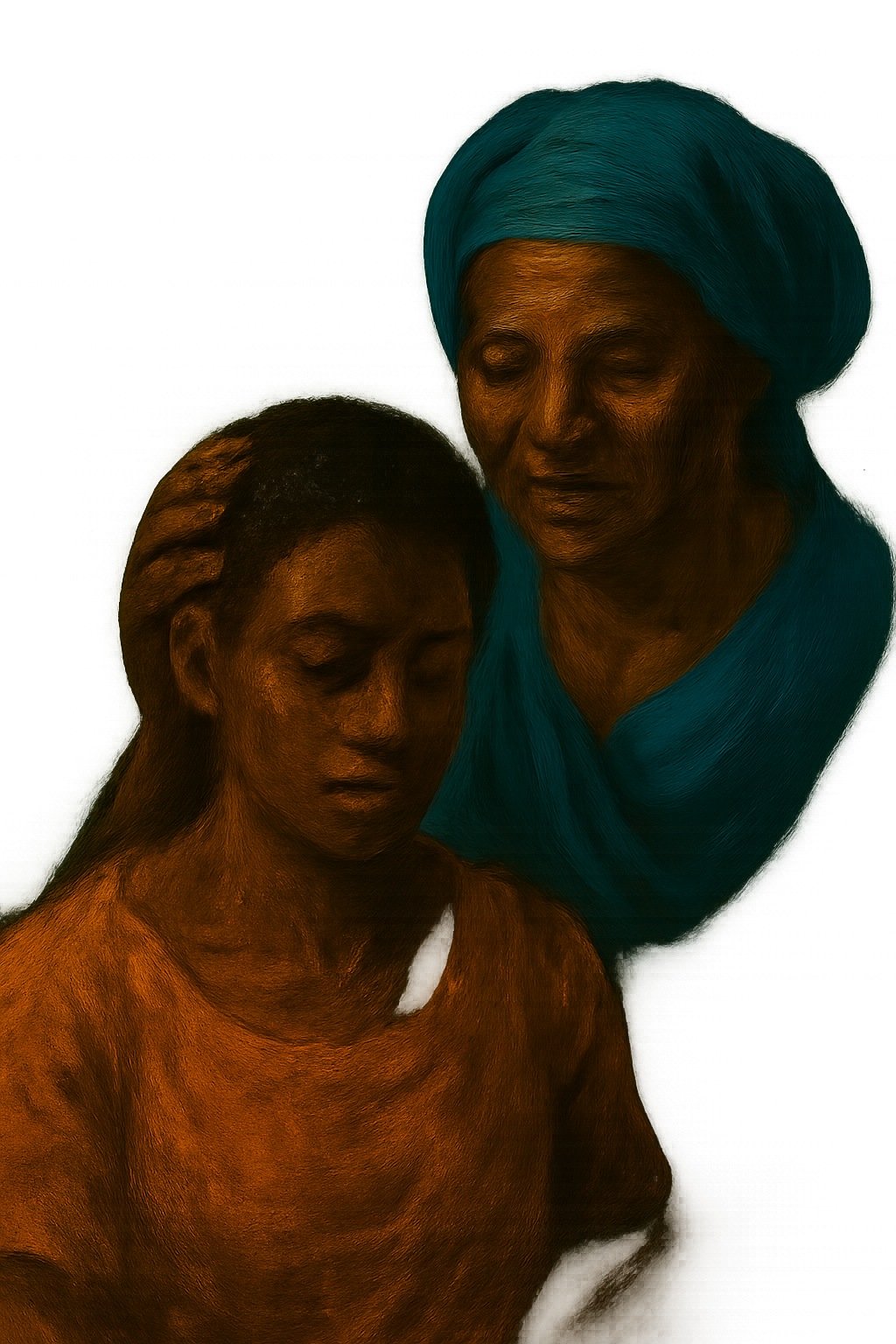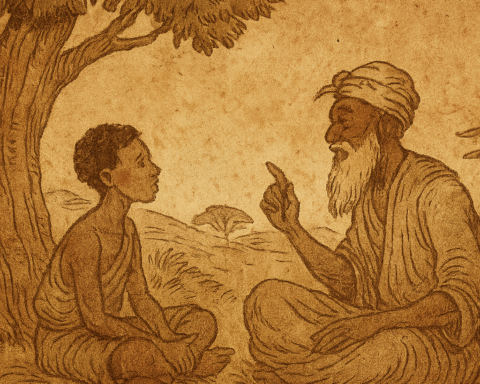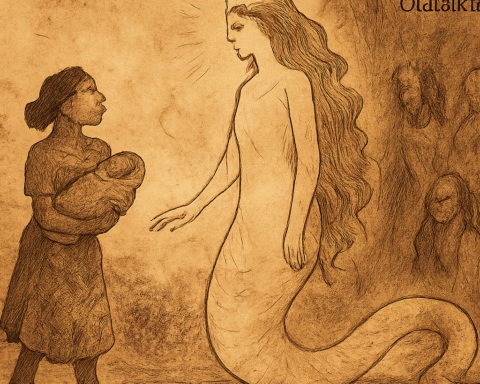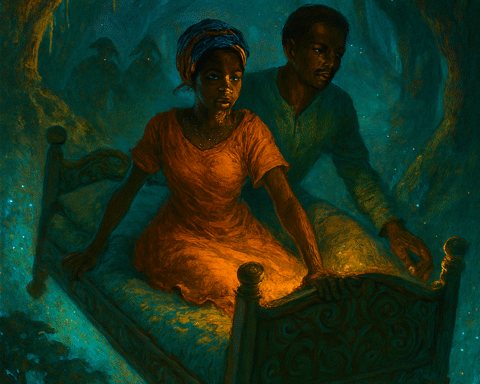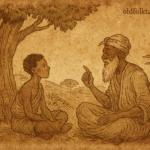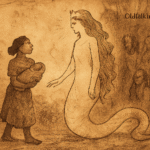In the verdant hills of ancient Togo, where the sacred forests of Ewe land stretched like green blankets across the earth, there ruled a powerful king in the mountain town of Kpalimé. His palace, built of red clay and crowned with palm thatch, overlooked terraced farms where yam vines climbed toward the sky and coffee plants bore their precious berries. The king’s greatest joy was his only daughter, Princess Akoua, born with skin like polished ebony and eyes that sparkled with the promise of wisdom.
But joy and sorrow often dance together in the same compound. On the very day of Akoua’s naming ceremony, when the talking drums should have echoed with celebration and the air should have been sweet with incense and palm wine, tragedy struck like lightning from a clear sky. The princess’s mother, consumed by jealousy and bitter anger toward the ancestral spirits who had denied her other children, spoke words that would haunt her daughter’s future.
With her dying breath, the queen’s voice rang out like a curse-laden wind: “Akoua will one day bring shame upon her name. She will bear a child outside of marriage, she will take the life of a man, and she will set fire to her father’s palace.” These terrible words hung in the air like smoke from a funeral pyre, and then the queen was gone, leaving behind only the echo of her curse and a daughter whose fate seemed sealed in darkness.
Also read: The Shepherd’s Daughter & Lost Prince
The king wept until his tears could fill the great calabash bowls used for ceremonial feasts. He consulted every diviner from Lomé to Atakpamé, offered sacrifices to the ancestors, and burned countless herbs in desperate attempts to undo his wife’s dying words. But the elders shook their gray heads sadly the words of the dead, especially words spoken in anger and pain, cannot be called back like birds to their roosts.
Years flowed by like the Mono River through the valleys, and Princess Akoua grew from a curious child into a graceful young woman. The king, lonely in his grand palace and weighed down by the shadow of the curse, decided to seek a new wife. The people of Kpalimé whispered among themselves like leaves rustling in the harmattan wind, their voices heavy with concern. Everyone knew the stories how stepmothers could be cruel as thorns, how jealousy could poison hearts, how a new wife might see the cursed princess as a threat to her own future children.
But the king chose wisely. He married Mama Yawa, a woman whose reputation for kindness had spread throughout the region like the fragrance of blooming frangipani. She was known as a healer who could coax life back into dying plants, who mixed medicines from forest herbs that could ease any pain, nd whose gentle heart had never harbored malice toward any living creature.
When Mama Yawa first heard the terrible details of Akoua’s curse, the people expected her to recoil in fear or perhaps demand that the princess be sent away to distant relatives. Instead, this remarkable woman drew Akoua close, her voice steady as granite: “My daughter, a curse is nothing more than a rope twisted tight around your future. But wisdom and love these are the hands that can untie any knot.”
As the seasons turned and Akoua blossomed into womanhood, the first dark thread of the curse began to weave itself into reality. A smooth-tongued nobleman, traveling through Kpalimé with a retinue of servants and stories of wealth from distant lands, caught sight of the beautiful princess at the market. With honeyed words and false promises of marriage, he deceived her innocent heart and then vanished like morning mist, leaving her carrying his child and drowning in shame.
When Akoua could no longer hide her condition, she expected rejection and disgrace. Instead, Mama Yawa wrapped her stepdaughter in arms of comfort and wisdom. Through the long nights of Akoua’s pregnancy, she sat beside her, telling stories of strong women who had overcome greater challenges, massaging her aching back with oils scented with lavender and shea. When the time came for the birth, Mama Yawa’s skillful hands guided the child safely into the world.
But the stepmother’s wisdom extended beyond the birthing hut. She had found a woman in a neighboring village—a good woman who had been married for many years but whose womb had remained empty despite countless prayers and offerings. With tears of joy, this woman welcomed Akoua’s baby as the answer to her deepest longings. The child would be loved and cared for, while Akoua’s reputation remained protected. The first knot of the curse had been loosened through love and careful planning.
Time passed, and Akoua had nearly forgotten about the curse when the second prophecy began to unfold. During the bustling chaos of market day, when vendors called out their wares and children chased chickens between the stalls, a violent argument erupted between two visiting warriors. Their dispute over a debt quickly escalated, and when one drew his weapon and lunged toward Princess Akoua whether by accident or design, she grabbed a nearby farming tool in self-defense.
In the struggle that followed, the warrior fell heavily, his head striking the hard-packed earth with a sound that made the crowd gasp in horror. He lay motionless, his breathing shallow, and whispers rippled through the marketplace: “The princess has killed a man. The curse is coming true.”
But Mama Yawa had been watching from her herb stall, and she moved with the swift grace of a woman who had spent years healing the injured and sick. Her hands flew over her collection of medicines, mixing leaves and roots with palm wine in precise measures that only a master healer would know. She poured the potion between the unconscious man’s lips, massaged his temples with healing oils, and whispered prayers to the spirits of the forest.
Slowly, miraculously, color returned to the warrior’s face. His eyes fluttered open, and he sat up, confused but very much alive. The crowd erupted in amazed chatter, and once again, Mama Yawa’s wisdom and quick action had turned aside the curse’s deadly promise.
Now came the final and most terrifying part of the prophecy: the burning of the king’s palace. During the grand harvest festival, when the entire compound blazed with torches and lanterns to celebrate the year’s abundance, Mama Yawa felt the familiar tingle of approaching danger. She had spent weeks preparing, storing large clay jars filled with water throughout the palace grounds and positioning piles of wet sand and clay in strategic locations.
Her foresight proved crucial when the seasonal winds rose unexpectedly, whipping the ceremonial flames into a hungry beast that began devouring the palm-thatch roofs and wooden walls. As people screamed and ran in panic, crying out that the curse was finally fulfilling itself completely, Mama Yawa took command with the authority of a general.
“Akoua, my daughter!” she called above the chaos. “Lead the people to the water jars! Form lines from the well to the fire!” Together, stepmother and stepdaughter organized the panicked crowd into efficient fire-fighting teams. They directed streams of water and handfuls of wet clay onto the flames, while Mama Yawa used her knowledge of wind patterns to predict where the fire would spread next.
Through the long night, they battled the blaze with courage and coordinated effort. When dawn broke over Kpalimé, the palace still stood scorched and smoke-stained, but intact. The curse had been not just averted but transformed from destruction into a demonstration of community unity and the power of preparation.
As the years passed, Princess Akoua grew into a wise and beloved queen, ruling with the same combination of love and wisdom that her stepmother had shown her. The story of how a good stepmother’s love had conquered an ancient curse spread throughout the land, carried by traveling griots and shared around countless evening fires.
And whenever mothers tucked their children into bed under the starlit sky of Togo, they would end this tale with the same gentle words: “Remember, little ones, not all stepmothers are cruel. Sometimes it is the heart of another woman that saves a child from the darkest fate.”
Moral Lesson
This beautiful Togolese folktale teaches us that love, wisdom, and preparation can overcome even the most seemingly insurmountable challenges. Mama Yawa’s unconditional love for her stepdaughter, combined with her practical wisdom and quick thinking, transformed what appeared to be inevitable tragedy into triumph. The story reminds us that family bonds are not limited to blood relations, and that sometimes the greatest love comes from those who choose to care for us. It also shows us that curses and negative prophecies can be broken through positive action, careful planning, and the support of those who believe in us.
Knowledge Check
Q1: Who was Princess Akoua and what curse did she face in this Togolese folktale? A1: Princess Akoua was the only daughter of the king of Kpalimé in ancient Togo’s Ewe land. Her dying mother cursed her to bear a child outside marriage, take a man’s life, and burn down her father’s palace three prophecies that seemed to doom her to disgrace.
Q2: How did Mama Yawa differ from typical stepmothers in folklore, and what made her special? A2: Unlike cruel stepmothers common in folktales, Mama Yawa was kind, wise, and loving. She was known throughout the region as a skilled healer who could make medicines from forest herbs and had a gentle heart that harbored no malice toward anyone, including her stepdaughter.
Q3: What wisdom did Mama Yawa use to help Akoua avoid the curse’s first prophecy about bearing a child outside marriage? A3: When Akoua became pregnant after being deceived by a false nobleman, Mama Yawa arranged for the baby to be raised by a barren woman who had prayed for years for a child. This solution saved the child, protected Akoua’s reputation, and showed how wisdom can transform potential shame into blessing.
Q4: How did Mama Yawa prevent the second part of the curse about taking a man’s life? A4: When Akoua accidentally injured a warrior during a marketplace fight, Mama Yawa quickly mixed a healing potion of leaves, roots, and palm wine. Her medical knowledge and swift action revived the unconscious man, preventing what could have been a death and the fulfillment of the curse.
Q5: What does this Ewe folktale from Togo teach about the power of preparation and wisdom? A5: The story shows that Mama Yawa’s foresight in preparing water jars and wet sand throughout the palace saved it from burning during the festival. This demonstrates that wisdom includes not just reacting to problems but anticipating and preparing for potential dangers before they occur.
Q6: What cultural values about family and stepmothers does this Togolese tale promote? A6: The folktale challenges negative stereotypes about stepmothers, showing that family bonds are built on love and choice rather than just blood relations. It emphasizes that true parental love involves sacrifice, protection, and wisdom, regardless of biological connection, reflecting Ewe cultural values about extended family and community support.
Source: Ewe folktale, Togo, West Africa
